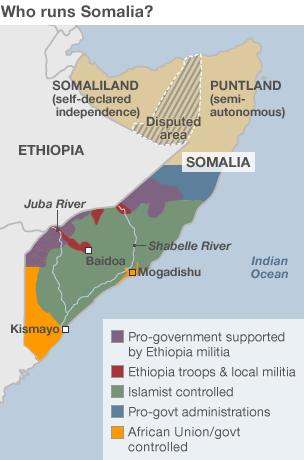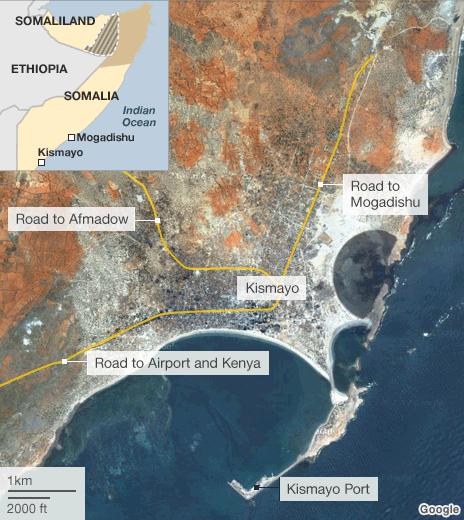Somalia Islamists abandon Kismayo amid AU attack
- Published
The BBC's Gabriel Gatehouse says residents are nervous about what may happen when troops enter the city.
Islamist militants in Somalia say they have withdrawn from their southern stronghold of Kismayo, following an African Union (AU) military attack.
Kenyan and Somali forces launched a beach assault on al-Shabab's last major bastion on Friday but encountered fierce resistance.
A Somali commander told the BBC that AU forces were not yet in the city.
Kenyan troops are part of a force trying to wrest control of the country for the new UN-backed president.
'Broader tactics'
Al-Shabab spokesman Ali Mohamud Rage told AFP news agency: "The military command of Shabab mujahideen ordered a tactical retreat at midnight."
Speaking to Reuters, the same spokesman confirmed the withdrawal, but added: "The enemies have not yet entered the town. Let them enter Kismayo, which will soon turn into a battlefield."
Al-Shabab commander Sheikh Mohamed Abu-Fatma confirmed the withdrawal orders to AFP: "We got orders from our superiors to withdraw from the city... this is part of broader military tactics we have set for the enemy."

Kenyan military spokesman Col Cyrus Oguna said the AU forces were in control of the northern parts of the city and were preparing to move to southern districts.
Kenya's Defence Minister Yusuf Haji told the BBC that al-Shabab had not yet vacated the area and it would "not be difficult for people who know the area well to sneak out without being detected".
But he said the people of Kismayo were "very happy and were welcoming Kenyan and Somali troops with both arms".
Kenya's Deputy Prime Minister Musalia Mudavadi said the Islamist withdrawal would "cut the lifeline of al-Shabab".
He said: "This is very important because Kismayo has been the port that al-Shabab have been using to get in the ammunition. It has been the port that has been the centre of the piracy menace that we have been experiencing along that coastline for quite some time."
On its Twitter account,, external the Islamists said their five-year administration in Kismayo had now shut its doors.
The al-Shabab-controlled radio station, Radio Andalus, is reported to be off air.
The BBC's Somalia Service has spoken to residents of Kismayo who confirmed that al-Shabab fighters had left during the night and the city was now calm.
One resident, Aweys, said the police station and main al-Shabab offices were closed, with some teenagers engaged in looting.
"But no-one is going near al-Shabab military bases, because they might be mined," Aweys said.
A spokesman for the Kenyan military told the BBC he feared the withdrawal might be a trap, so at present no-one is in control of Kismayo, says the BBC's Gabriel Gatehouse in Nairobi.
Kenyan troops had launched airborne and amphibious landings before dawn on Friday, supported by Somali government forces.
The key beach landing was near the main road to Mogadishu.
The Kenyan military said the city was expected to fall quickly but al-Shabab continued its resistance throughout the day.
Strategic city
Correspondents say the loss of Kismayo will be a major blow to the Islamists.
Somalia's second largest port is a significant source of revenue for whoever controls it.
Al-Shabab, which is aligned to al-Qaeda, has also used the port to bring in weapons.
African Union troops pushed al-Shabab from the capital, Mogadishu, in August 2011 and, along with other pro-government forces, have since taken control of most of the other towns previously in militants hands.
But the group's fighters are still highly active in much of the countryside in southern and central Somalia and have carried out suicide bombings and other attacks in cities they no longer control.
Kenya began its intervention in Somalia nearly a year ago after a spate of cross-border attacks blamed on al-Shabab.
Since the overthrow of President Siad Barre in 1991, Somalia has seen clan-based warlords, Islamist militants and its neighbours all battling for control.
